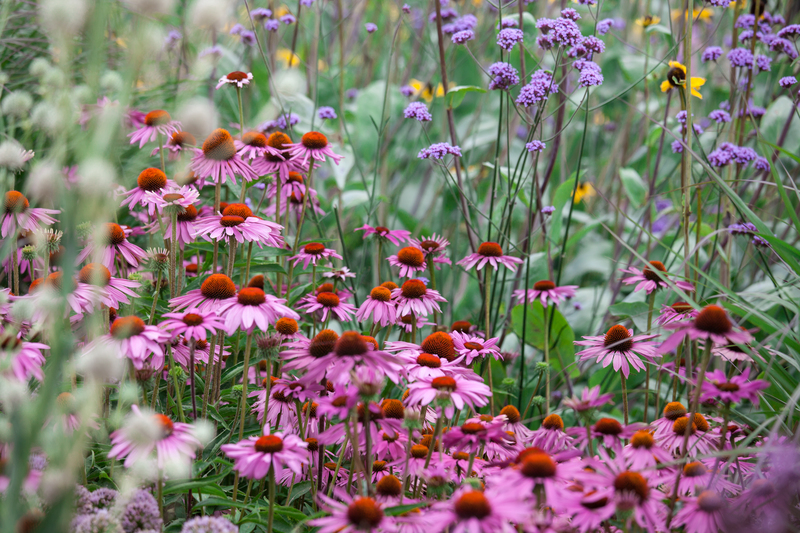Zen Garden Plans for Cultivating Outdoor Peace
Posted on 04/10/2025
Zen Garden Plans for Cultivating Outdoor Peace
Zen gardens--also known as Japanese rock gardens or kare-sansui--are sanctuaries of serenity, mindfulness, and deliberate beauty. Planning and cultivating your own outdoor Zen space offers more than simple aesthetics; it presents an ongoing connection to nature, tranquility, and personal reflection. In this comprehensive guide, explore inspiring Zen garden plans, core principles, design elements, and practical advice to create your ideal peaceful outdoor retreat.
What is a Zen Garden?
Zen gardens originated in medieval Japan, designed to aid Buddhist monks in meditation and contemplation. These minimalistic gardens emphasize simplicity, balance, and the use of natural materials like rocks, sand, moss, and carefully chosen plants. Their unique style, symbolic elements, and mindful construction have inspired gardeners and homeowners worldwide, offering a timeless template for cultivating outdoor peace.
- Minimalist aesthetics--Emphasis on simplicity and intentional design
- Symbolism--Elements represent nature, philosophical concepts, and serenity
- Low maintenance--Ideal for busy lifestyles
- Meditative space--Promotes relaxation and mindfulness

Key Principles of Zen Garden Design
Understanding the foundational principles of Zen garden design is essential before laying out your plan. The following concepts guide the creation of any authentic and harmonious Zen-inspired landscape:
1. Simplicity (Kanso)
When planning your Zen garden layout, embrace simplicity and eliminate unnecessary elements. Each component should have a purpose, contributing to the garden's peaceful ambiance.
2. Naturalness (Shizen)
Choose natural materials--stone, gravel, moss, and weathered wood--over synthetic options. The garden should feel organic, reflecting the imperfections and changing seasons of nature.
3. Balance and Asymmetry (Fukinsei)
Zen gardens rarely use perfect symmetry. Instead, achieving a visually pleasing arrangement through asymmetry creates dynamic interest and a natural aesthetic.
4. Symbolism and Suggestion
Each element in a Zen garden often symbolizes larger landscapes: raked gravel evokes flowing water, standing stones conjure mountains, and moss patches symbolize islands. Thoughtful placement invites contemplation.
5. Space and Emptiness (Ma)
Embrace empty spaces in your Zen garden plans. These voids are as important as solid objects, offering the mind room to wander and rest.
Planning Your Outdoor Zen Garden
Before grabbing a shovel, develop a clear and organized plan. Thoughtful design ensures your Zen retreat feels cohesive, calming, and meaningful.
1. Consider Your Site
- Size--Zen gardens can range from tabletop displays to entire yards. Assess your available space.
- Sun & Shade--Note patterns of sunlight and shade throughout the day.
- Views--Choose a location visible from indoors or other garden areas for year-round enjoyment.
- Drainage--Ensure water will not collect or erode garden features.
2. Design Styles: Traditional vs. Contemporary Zen Gardens
There are many interpretations of the outdoor Zen garden:
- Traditional Zen Garden--Features rocks, white gravel or sand, moss, and some carefully selected plants. Water is typically represented symbolically, not present physically.
- Contemporary Zen Oasis--May include water features, modern sculptures, benches, and expanded planting, blending traditional design with personal flair.
Determine your preferred style before drawing your Zen garden plan.
Essential Elements of a Zen Garden
To authentically cultivate outdoor peace with your Zen garden, include these time-honored features:
1. Rocks and Stones
- Symbolism--Rocks represent mountains, islands, or living beings within the garden.
- Placement--Group stones in odd numbers; avoid perfect symmetry.
- Types--Use weathered, natural-looking stones; differing shapes and sizes add visual interest.
2. Gravel and Sand
- Function--Gravel or sand is raked to represent rippling water or waves.
- Materials--Choose pale, finely crushed granite, marble chips, or decorative sand for easy raking and maximum visual impact.
3. Moss and Plants
- Moss--A classic groundcover in Zen gardens, moss provides softness and lush green hues.
- Pines and Maples--Small pines, maples, and evergreens offer structure and year-round interest.
- Bamboo--Adds height, sound, and a touch of vertical interest.
- Fern, Azalea, and Camellia--Traditional choices for color and texture; keep plantings sparse for a true Zen look.
4. Water Elements
- Dry gardens--Symbolize water with rocks and raked sand; ideal for low-maintenance, classic Zen gardens.
- Water features--Small pond, stream, or tsukubai (stone basin) can be added for a soothing, contemporary touch.
5. Bridges, Steps, and Pathways
- Purpose--Guide movement, offer perspective shifts, and create a journey of discovery.
- Materials--Use natural stepping stones, gravel paths, or rustic wooden bridges.
6. Garden Accessories
- Lanterns--Stone or bamboo lanterns add ambiance and traditional Japanese style.
- Benches--Provide seating for reflection and contemplation.
- Fences and Screens--Define the space and add privacy.
Step-by-Step Zen Garden Construction Plans
With site and design in mind, follow these actionable steps to bring your Zen garden ideas to life:
- Clear the Area: Remove grass, weeds, and debris. Level the ground if necessary.
- Install a Border: Use stone, timber, or metal edging to define the garden's shape and hold gravel in place.
- Add Landscape Fabric: Lay down landscaping fabric to suppress weeds beneath gravel or sand.
- Arrange the Stones: Position large rocks first, guided by your plan. Remember to group them naturally and avoid symmetry.
- Add Plants: Plant moss, evergreens, or accent shrubs as needed. Less is more--emphasize open spaces.
- Spread Gravel or Sand: Pour a 2-3 inch layer of chosen material over the landscape fabric and rake smooth.
- Rake Designs: Use a wooden or metal rake to make swirling, parallel, or radiating lines, symbolizing water movement.
- Add Finishing Touches: Place a lantern, bench, or bamboo fence as desired to complete your peaceful haven.
Plant Selection for Outdoor Zen Gardens
Choosing the right plants is essential for both authenticity and low-maintenance Zen landscapes:
- Moss--Low-growing, shade-loving, requires moisture (e.g., Irish moss, sheet moss).
- Bamboo--Non-invasive clumping varieties for privacy and gentle sound (e.g., Bambusa, Phyllostachys).
- Japanese Maple (Acer palmatum)--Slow-growing, beautiful fall color, elegant silhouette.
- Black Pine (Pinus thunbergii)--Classic in Japanese gardens, drought tolerant.
- Azalea & Camellia--Seasonal blooms add subtle color and traditional charm.
- Ferns--Enhance the garden's texture and provide lush, green highlights.
Tip: Choose plants that suit your climate and local conditions. Opt for slow growers for a low-maintenance peaceful garden.
Maintaining Your Zen Garden
One of the key features that make Zen gardens appealing is their low maintenance. However, routine care ensures lasting beauty and tranquility. Here are some expert tips:
- Rake regularly--Maintain the patterns in sand or gravel. Raking doubles as a meditative exercise.
- Weed control--Remove weeds promptly to preserve a neat, uncluttered look.
- Prune gently--Shape shrubs and trees with restraint; avoid fussy topiary.
- Algae and Moss--Monitor moisture, clear debris, and thin moss if overgrown.
- Stone maintenance--Clean and reposition stones as needed to maintain aesthetic harmony.
Creative Zen Garden Ideas for Every Space
Your outdoor Zen garden plan can be adapted to fit any setting, regardless of size or location:
- Mini Zen Gardens--Perfect for patios, balconies, or small yards.
- Zen Courtyards--Transform an enclosed space into a tranquil retreat.
- Zen Pathways--Thread a raked gravel path with stepping stones through an existing garden.
- Zen Meditation Zones--Designate a secluded corner for yoga or quiet reflection.
- Modern Zen Oases--Add outdoor sculptures, contemporary benches, or water features for a unique spin.
Benefits of Cultivating an Outdoor Zen Garden
Beyond their stunning beauty, Zen-inspired peaceful gardens offer practical and emotional rewards:
- Stress relief--Meditative design calms the mind and soothes anxiety.
- Mindfulness--Ritual tasks like raking gravel foster presence and focus.
- Wildlife value--Native plants and water features attract birds and pollinators.
- Property value--Unique, beautifully designed landscapes enhance curb appeal.
- Year-round beauty--Evergreens, rocks, and minimalistic design look elegant across seasons.

Frequently Asked Questions About Zen Garden Plans
How much space do I need for a Zen garden?
Zen gardens can be created in areas as small as a tabletop tray or as large as a courtyard. The principles remain the same--use scale and proportion suited to your site.
Can I incorporate water features in my outdoor Zen garden?
Traditionally, kare-sansui symbolizes water without using it. However, small ponds, bubbling fountains, or tsukubai (stone basins) can be included in modern or hybrid Zen gardens.
Are Zen gardens suitable for beginners?
Yes! Their minimal plantings, hardy elements, and intuitive maintenance make them perfect for new gardeners or those seeking a low-maintenance landscape.
When is the best time to build a Zen garden?
Any time during the growing season--spring or fall is ideal for planting moss and shade-loving plants, while hardscaping can be done throughout most of the year.
Final Thoughts: Your Path to Outdoor Peace
Embracing Zen garden plans to cultivate outdoor peace doesn't require vast resources or intricate expertise. By focusing on simplicity, balance, and meaningful design, you can transform any corner into a deeply restorative space--perfect for meditation, mindfulness, or simply unwinding from the world.
Whether you choose a classic dry landscape or a modern Zen sanctuary with water and contemporary features, the process of creating and tending your garden becomes a peaceful ritual in itself. Start your Zen garden journey today and watch as your outdoor haven blossoms into a lifelong source of serenity and inspiration.
Latest Posts
Zen Garden Plans for Cultivating Outdoor Peace
Enhance Garden Ambiance with Perfectly Planned Seating
How to Design an Herb Garden for Maximum Growth
Revamp Your Hedge Trimming Approach with Expert Shapes and Techniques

